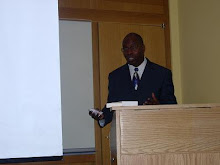A few days ago former president of Cuba, Fidel Castro, denounced Obama's plan to continue the American embargo against the island republic. Obama maintained that substantial changes on human rights, and the resurfacing of democratic rule must be in placed before the United States considers the removal of economic sanctions. Castro responded, the continued American policy hurts Cubans; but, conceded that Obama's idea of easing travel restrictions to Cuba was a step in the right direction.
Obama's views on Cuba is not just political; but also, humanist. Following the great Illinoian Abraham Lincoln who used politics and war to eradicate the social-economic desease of slavery Obama is logically reviewing a policy that is not only harmful to Cubans; but also, to Americans. The Senator represents the largest exporters of soybeans in the world--Illinios farmers. These farmers, like producers of beef, pork, and chickens are competing head-to-head with Brazilian farmers. Both nations realize, especially in the soybean trade, that new markets are vital to their economy. Now, comes Cuba. Cuba wants soybeans, a crop that can't be grown in the Caribbean. The use of the crop is multi-facit; from human consumption, to feeding of lifestock, to the making of bio-fuel. In essence, it is a cheap high yield protein crop that can benefit Cuba and ease the economic suffering of American farmers and support base industries.
In 1999 Republican governor--George Ryan, in which I laid the foundation, led a 45 member delegation to Cuba to meet with President Fidel Castro on issues of farm and pharmaceutical trade. Ryan became the first sitting U.S. governor to travel to Cuba since the 1959 Cuban revolution. He stated that the trip was designed to "build bridges and exchange ideas." Quoting Abraham Lincoln, Governor Ryan stated, "The probability that we may fail in the struggle should not deter us from support of a cause that we believe to be just." That is, humanity is greater than the interest of short minded politicians. While Ryan's delegation did not conclude with the normalization of relations; it did end on a positive note by bringing a severly sick Cuban youngster back to the United States for treatment at the University of North Carolina Medical Center. But, the basic issue is that the United States trade with China, Russia, North Korea (food not to expand nuclear weapons), and Saudi Arabia--nations that have notorious human rights records. If we can trade with these nations to feed their hungry; we should be able to trade with Cuba, a nation that is tied to the history and growth of the United States.
Now, does this mean that Obama, if he becomes the president of the U.S. will he be soft on Cuba? Of course not. But it does mean that he will review current policies towards the Castro government and make informed decisions. Contrary to other candidates who will wholesale follow blindly a 48 year old Kennedy Cuban policy of isolationism. The Obama Cuban policy is not rooted in partisan thought; but rather the political-historical legacy of Illinoian statesmen who valued humanity more than politics.
Poem: snow is unrisen
10 hours ago


No comments:
Post a Comment